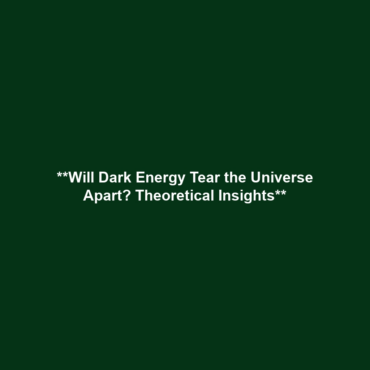Theoretical Consequences: Will Dark Energy Tear the Universe Apart?
Dark energy, a mysterious force driving the accelerated expansion of the universe, poses significant theoretical consequences within the realm of cosmology. This article explores the idea that dark energy may ultimately tear the universe apart, an event referred to as the “Big Rip.” Understanding these theoretical consequences is essential not only for astrophysicists but also for anyone fascinated by the fundamental workings of the cosmos.
Key Concepts
To comprehend the implications of dark energy, we must delve into several key concepts:
- Dark Energy: Constituting approximately 68% of the universe, dark energy opposes gravitational forces and drives cosmic expansion.
- Cosmic Acceleration: Observations indicate that galaxies are moving away from each other at an increasing rate, attributed to dark energy.
- The Big Rip Hypothesis: A theoretical scenario where dark energy’s repulsive force becomes so dominant that it could eventually tear galaxies, stars, planets, and even atoms apart.
Applications and Real-World Uses
The study of dark energy and its theoretical consequences has broad implications in both science and technology:
- Cosmological Observations: Understanding dark energy aids in refining our models of the universe, which can enhance the accuracy of astronomical predictions.
- Innovative Technologies: Advances in telescope design and observational methods help scientists gather data on dark energy, supporting further research into cosmic phenomena.
Current Challenges
Despite progress in understanding dark energy, researchers face several challenges in studying its consequences:
- Complexity of Measurement: Accurately measuring the effects of dark energy over vast cosmological distances remains difficult.
- Lack of Empirical Evidence: Direct evidence for dark energy properties and behaviors is still limited, complicating theoretical modeling.
- Competing Theories: Numerous hypotheses about dark energy exist, creating challenges in consensus among scientists.
Future Research and Innovations
Looking ahead, scientists anticipate several innovations in research related to dark energy:
- Advanced Space Telescopes: Next-generation observatories, like the James Webb Space Telescope, will provide unprecedented insight into cosmic expansion and dark energy behavior.
- Artificial Intelligence: AI-driven data analysis could uncover patterns and correlations in astronomical data that have thus far gone unrecognized.
- Collaborative Research Projects: International collaboration will likely enhance the study of dark energy, pooling resources and expertise to address fundamental questions.
Conclusion
In summary, dark energy holds significant theoretical consequences that could ultimately determine the fate of our universe. Understanding whether dark energy will tear the universe apart remains a pivotal question in cosmology. Continued research in this field could illuminate the vast complexities of dark matter and dark energy. For further reading on this topic, explore our articles on Dark Matter and Cosmic Expansion.

